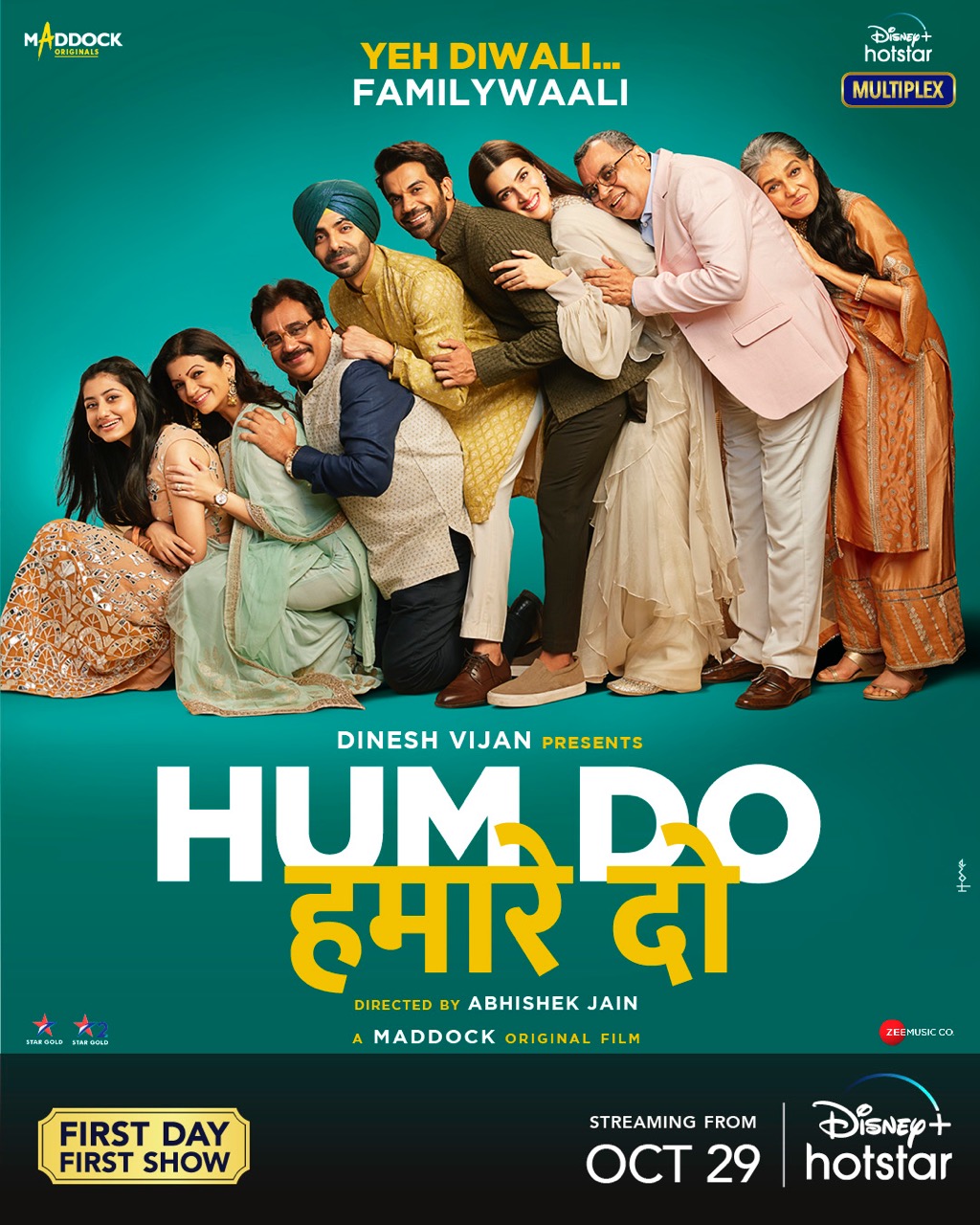Family isn’t always defined by blood, and this film brings that message home with charm and humor. Hum Do Hamare Do, a 2021 family comedy-drama directed by Abhishek Jain, stars Rajkummar Rao, Kriti Sanon, Paresh Rawal, and Ratna Pathak Shah. Set in contemporary urban India, the film explores a unique blend of romance, comedy, and heartwarming emotions, all within the broader theme of unconventional families. It falls under the genre of romantic comedy with a social message, capturing both the laughs and the tears that come with creating a family through choice rather than circumstance.
The story revolves around Dhruv (played by Rajkummar), an orphan who has made a successful life for himself, yet feels incomplete when it comes to his personal life. He falls in love with Anya (Kriti), an independent and grounded woman who values family above everything else. This sets up Dhruv’s central dilemma—he must ‘acquire’ a set of parents to win Anya’s heart, leading him to adopt the quirky Purshottam (Paresh) and Deepti (Ratna) as his fake parents. What ensues is a series of comedic mishaps and heartfelt moments as Dhruv struggles to pull off this elaborate ruse while discovering the true meaning of family along the way.
Rajkummar’s portrayal of Dhruv is one of the strongest aspects of the movie. He excels in balancing the humor and vulnerability of his character, seamlessly transitioning between comedic moments and more serious, emotional beats. Rajkummar, known for his versatility, brings depth to a role that could have easily been reduced to a mere caricature in the hands of a lesser actor. His chemistry with Kriti is believable, and she complements him well with her performance as the spirited yet sensitive Anya. Kriti, although not given as much screen time or complexity as her co-star, delivers a sincere performance that adds a layer of warmth to the narrative. However, it is Paresh and Ratna, as the pseudo-parents, who steal the show. Their banter, timing, and emotional range give the film its heart and elevate the simple plot into something more touching. Their backstories are explored with care, making them more than just comedic props—they are central to the film’s message about family and belonging.
The direction by Abhishek is steady and allows the film to flow at an easy, entertaining pace. He has a knack for handling lighthearted moments and balancing them with emotional undertones, making sure the film doesn’t become overly sentimental or slapstick. The screenplay is filled with funny dialogues and situational comedy, especially when Paresh and Ratna are on screen. The film’s central plot device—a man ‘adopting’ fake parents—might sound absurd on paper, but Abhishek’s direction ensures that the story stays grounded, making you invest in the characters and their relationships.
The cinematography by Amalendu Chaudhary deserves mention, especially in how it captures the warmth and coziness of family life. The visuals are simple yet effective, with a focus on domestic settings that underline the film’s theme. The scenes in Dhruv’s modern apartment, contrasted with Purshottam and Deepti’s more humble abode, subtly reflect the clash and eventual merging of different worlds. There’s a sense of authenticity in how urban spaces are portrayed, making the audience feel like they’re watching real people in real environments rather than highly stylized sets.
Music plays a key role in creating the film’s lighthearted atmosphere. Composed by Sachin-Jigar, the soundtrack is peppy and situational, enhancing the narrative without overshadowing it. Songs like “Bansuri” and “Kamli” are catchy and bring a youthful energy to the film, while the background score punctuates the emotional moments well. The music doesn’t overstay its welcome, and the dance sequences feel organic to the story rather than forced.
Another strength of the film is its editing. Dipika Kalra’s crisp editing ensures that the film never drags, despite its relatively predictable storyline. The comedic scenes are paced well, allowing for the humor to land effectively, while the emotional beats are given enough time to resonate with the audience. Even with the blend of genres—romance, comedy, drama—the film maintains a consistent rhythm, never feeling disjointed or cluttered.
While Hum Do Hamare Do excels in many areas, it’s not without its flaws. The screenplay, although engaging, follows a somewhat predictable trajectory. There are few surprises in the narrative, and seasoned viewers might see the plot twists coming from a mile away. Additionally, some of the secondary characters feel underdeveloped, particularly in how they contribute to Dhruv’s life beyond the central plot of his adopted family. There’s also a sense that the film could have dug deeper into the emotional complexity of its characters, especially considering the rich potential of its theme—what defines a family?
Despite these minor shortcomings, the film delivers what it promises: a wholesome, heartwarming experience. It doesn’t aim to be groundbreaking, but it succeeds in creating a relatable, feel-good story about love, family, and the lengths we go to for the people we care about. The performances, especially by Paresh and Ratna, are enough to keep you hooked, and the film’s humor ensures that it remains an entertaining watch from start to finish.
In conclusion, Hum Do Hamare Do is a delightful family entertainer that is worth watching for its endearing performances and lighthearted approach to a deep, universal theme. While it may not break new ground in terms of storytelling, its heart is in the right place, and it offers plenty of laughter and warmth. If you’re looking for a film that emphasizes the importance of chosen families, with a good dose of humor and some memorable performances, this one is definitely worth a watch.







